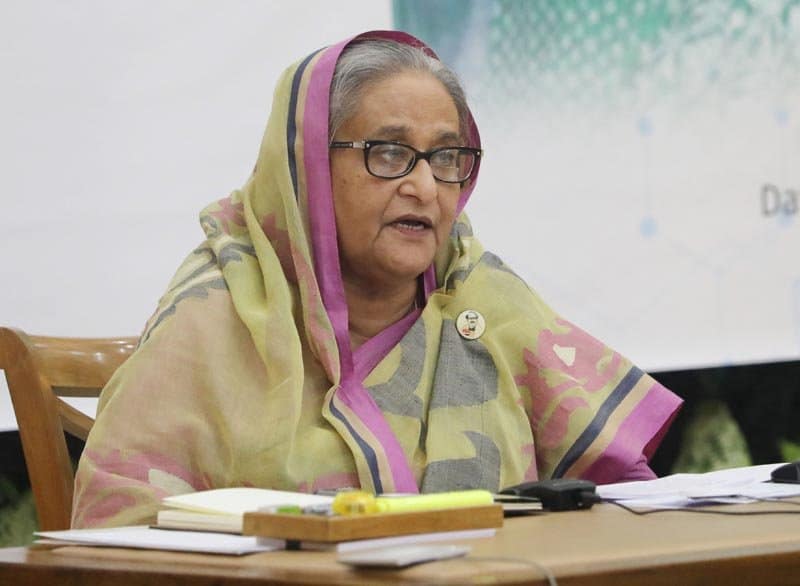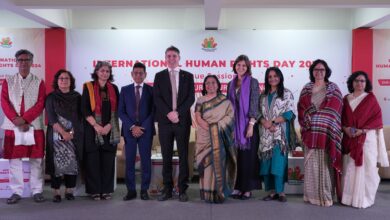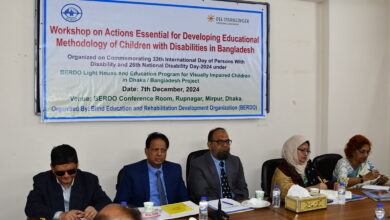PM stresses collective efforts, innovative action plans to achieve SDGs

Prime Minister Sheikh Hasina today emphasised accurate and innovative action plans and effective monitoring systems with collective efforts to achieve the Sustainable Development Goals (SDGs) by 2030.
“It is challenging to ensure the implementation of the SDGs in the stipulated time. But, still, I believe that it would be possible to reach the goal through accurate and innovative action plans, effective monitoring systems and collective efforts,” she said.
The premier said this while speaking as the chief guest at the opening ceremony of the three-day 2nd National Conference on SDGs Implementation Reviews (SIR) held at Bangabandhu International Conference Centre (BICC) in the city.
She joined the function virtually from her official Ganabhaban residence here.
She said, “I believe that if we all work together, we could achieve SDG goals before 2030 and fulfill our Father of the Nation Bangabandhu Sheikh Mujibur Rahman’s dream of building a hunger-poverty free and developed-prosperous Bangladesh by 2041”.
The prime minister asked the government and private sectors to work in ensuring Bangladesh’s overall development and thus achieving the SDGs, saying the government would provide all possible support to this end.
“We will continue policy support and funding for SDGs implementation, but we must ensure the best use of funds, and wastage must be prevented. At the same time, effective initiatives need to ensure that international commitments are appropriately met and implemented,” she said.
The premier said Bangladesh has not only adopted the SDGs as a global development concept.
“Bangladesh started formulating this global target to suit its own needs, which has come to be known as SDG Localization. Under this initiative, out of 17 goals, 39 indicators have been identified as SDG priority areas for Bangladesh,” she said.
In addition, she also said considering the reality of each district, one additional indicator has been determined.
She hoped that this priority list will foster monitoring and implementation of the SDGs in all government departments at the District, Upazila, and grassroots levels and will accelerate the performance of the SDGs and simultaneously hasten the country’s ongoing development.
Although SDG is a global development concept, it is also very relevant in the development discourse of Bangladesh, she said, adding that Bangladesh was actively involved in formulating the SDGs from the very beginning.
In 2013, taking the views of all relevant stakeholders of the country, Bangladesh proposed 11 goals to the United Nations, she said.
Of these, ten were exactly adopted by the United Nations, and the remaining one was included in the other goals of Agenda 2030, she continued.
As a result, from the time of adoption of the SDGs, she said it has been possible to formulate various policies and strategies for Bangladesh in line with the SDGs.
The prime minister also said Bangladesh has already made significant progress in formulating plans and strategies to implement the global development agenda for the period of 2016-2030.
“The world has appreciated our steps to implement the SDGs. The Sustainable Development Solutions Network (SDSN) awarded us the ‘SDG Progress Award’ as Bangladesh has made remarkable progress in achieving SDGs in the first five years among all the UN member countries,” she said.
Planning Minister M A Mannan, State Minister Dr. Shamsul Alam and the UN Resident Coordinator (in charge) Tuomo Poutiainen spoke on the occasion while Principal Coordinator, SDG Affairs, Zuena Aziz, gave the address of welcome.
Member (Secretary) of the General Economic Division Dr. Md. Kawser Ahmed gave a brief presentation on Bangladesh’s SDG progress and plan to achieve it.
A video documentary on SDG was screened on the occasion.
The prime minister also unveiled the cover of a publication on SDG.
Sheikh Hasina referred to Bangladesh’s success in implementing the Millennium Development Goals (MDGs) that has brightened the country’s image in the international arena.
She said, “Our government is committed to implementing the ‘Agenda 2030’ or the Sustainable Development Goals (SDGs) to continue the pace of development.”
The premier said all the ministries, departments have prepared an action plan to implement the SDGs.
“Considering the importance of SDG implementation, the Principal Coordinator for SDG Affairs post has been created at the Prime Minister’s Office as under her leadership, a high-level ‘SDG implementation and Review Committee’ was formed with the concerned secretaries,” she said.
In addition to the ministry-based activities for effective implementation of SDGs, she said that the Governance Innovation Unit of the Prime Minister’s Office is implementing a special project for enhancing public administration skills in implementing the SDGs.
As the Awami League formed the government, it has taken special initiatives for the country’s overall development and ensuring fundamental rights of all people, the prime minister said.
Initiatives like Palli Sanchay Bank, Ashrayan Project, Digital Bangladesh, Education Assistance Programme, Women’s empowerment, Electricity for all, Community Clinics and Child Development, Social Security Programmes, Environmental Protection, and Investment Development are already playing significant roles in the overall development of the country, she said.
As a Chair of the Climate Vulnerable Forum, Bangladesh has drafted the ‘Mujib Climate Prosperity Plan’ to achieve energy independence and set Bangladesh’s trajectory to prosperity, she said.
“We have handed over 183 thousand 3 homes to the homeless across the country by April 2022. We have provided 640 climate refugee families with new homes in Cox’s Bazar, and in total 4 thousand, 409 climate refugee families will get new homes by 2023,” she said.
The prime minister said Bangladesh is passing seven years on the path of achieving the SDGs.
She said that in the last two years, SDG implementation has slowed down due to the COVID-19 pandemic. “However, intending to achieve the goal, we are working to the best of our ability,” she said.
The economy is returning to increased growth with the government providing timely stimulus packages and appropriate policy support to this end, she stated.
The prime minister said the SDG Implementation Review (SIR) Conference 2022 is very significant as the world is now going through a critical juncture due to the Covid-19 pandemic and the Russia-Ukraine war.
Sheikh Hasina stressed initiatives keeping those already attained intact to achieve the SDGs within the stipulated time in the reality of the ongoing pandemic and the war that heavily hurt the world economy and livelihoods.
“I hope that through this conference, the organizations involved in the implementation of SDGs will be able to review their implementation progress and identify potential challenges and find solutions,” she said.
Taking in view the ongoing global pandemic and Russia-Ukraine war, she said the people would have to show austerity in using water, electricity and food grains as the entire world has been rattled due to the double blow.
The premier reiterated her call to grow more foods so the country would not face any crisis which many countries across the globe are now encountering, saying, “Don’t put one inch of land uncultivated.”
In our planned development journey, she said that development partners, NGOs, and civil society are equally involved with the government.
“I believe that the participation of all stakeholders in this conference will further accelerate the future progress of Bangladesh,” she said.
Sheikh Hasina said that the private sector plays a vital role in keeping the wheel of Bangladesh’s economy in motion and the climate related investment has already been made more conducive for the private sector.
The prime minister said that her government’s target is to ensure rural centric development as the fruits of prosperity can make people of all sections beneficial.
“We have delivered electricity to every house. Once the mega projects for infrastructure development are fully implemented, the country’s economy will be more vibrant, poverty will reduce and the overall development of the people will be ensured,” she said.
The prime minister said some people are making wholesale criticisms about the quick rental plants, but unfortunately they’re not talking about the impact of giving electricity to every house or its impact on the country’s overall economy and development.
She suggested those people to roam the villages to witness the overall development of the country and the state of farmers, labourers and distressed people at the grassroots despite making illogical criticism residing in Dhaka.





